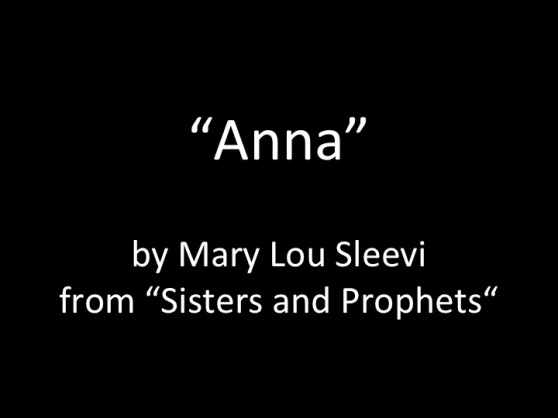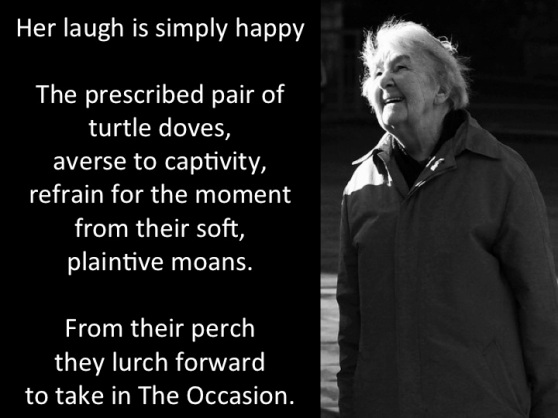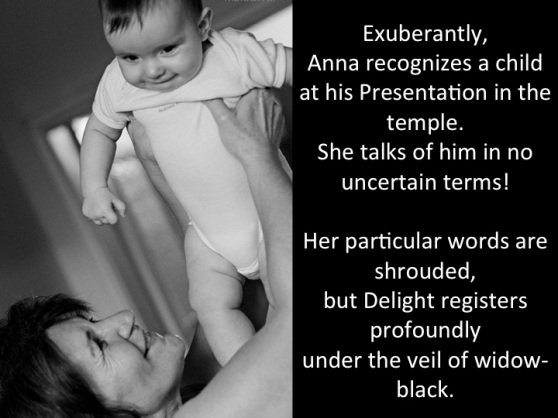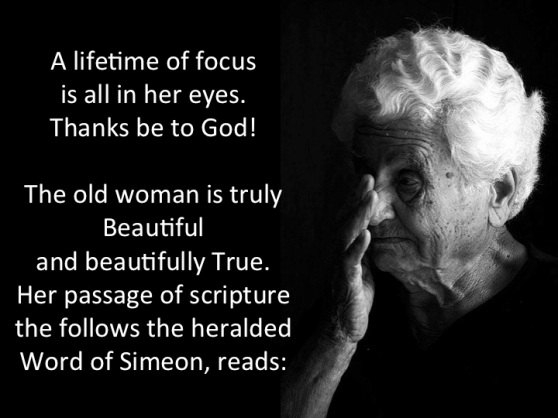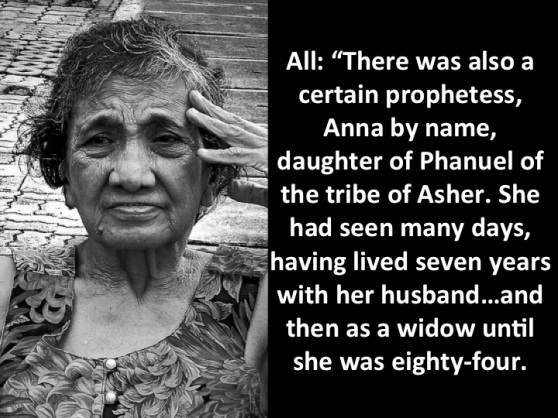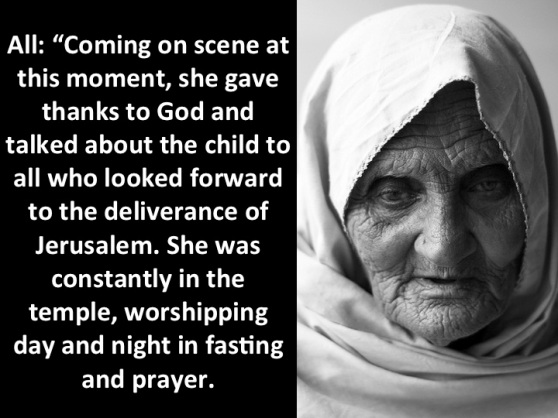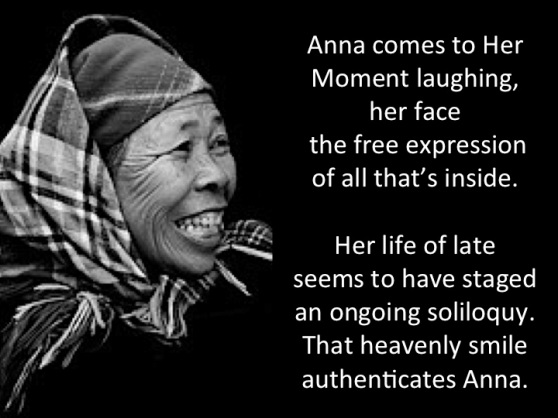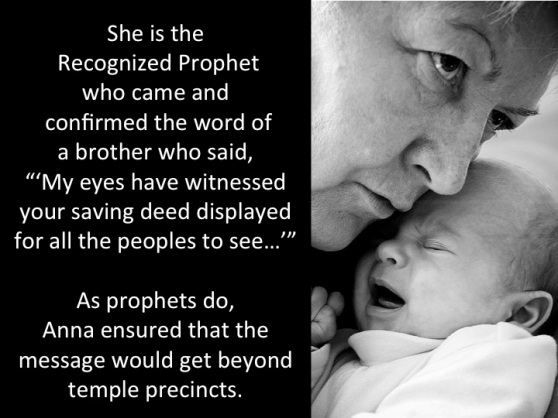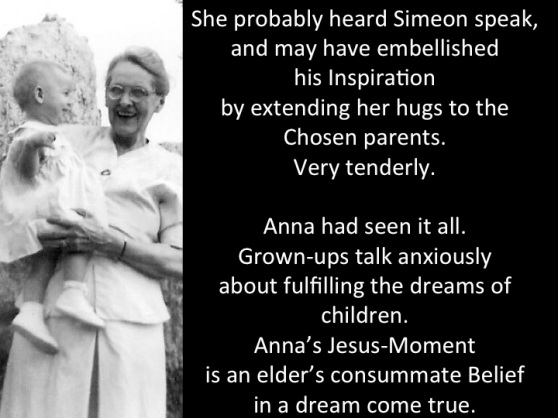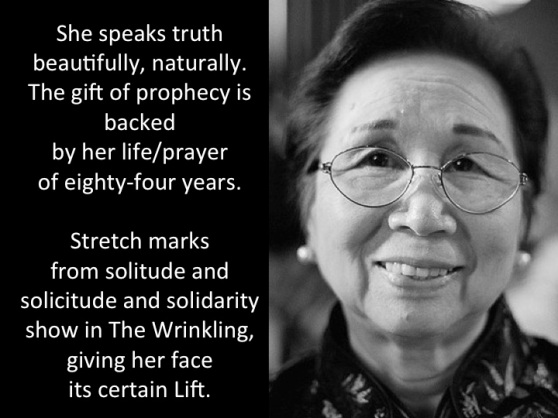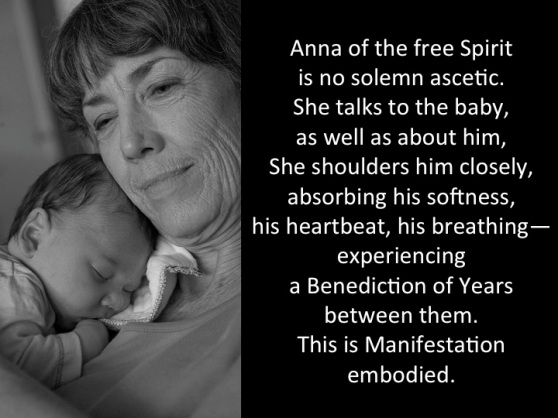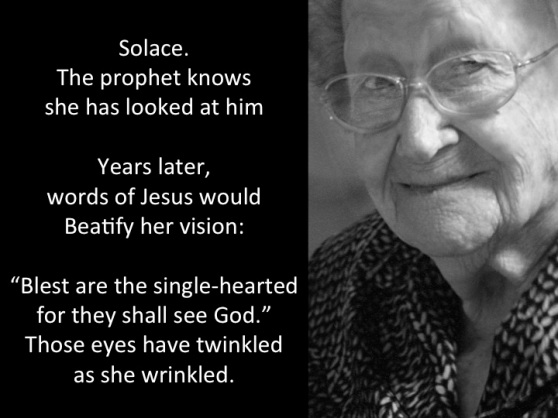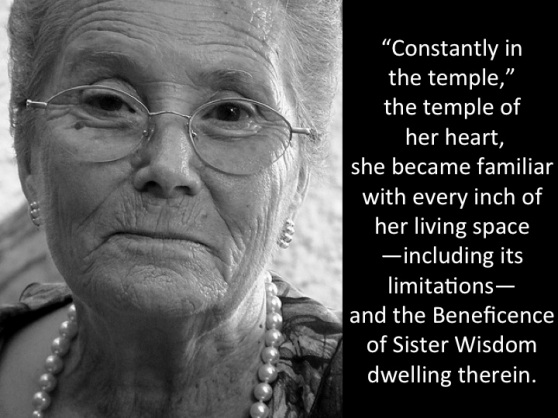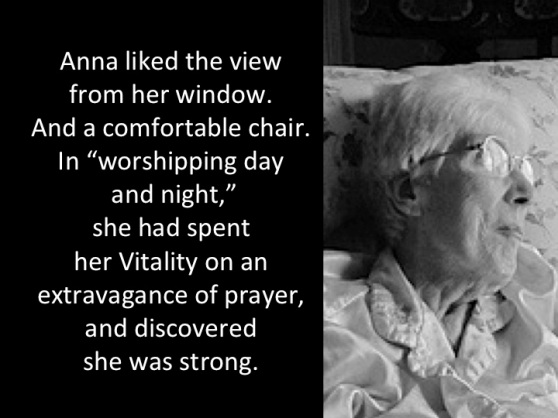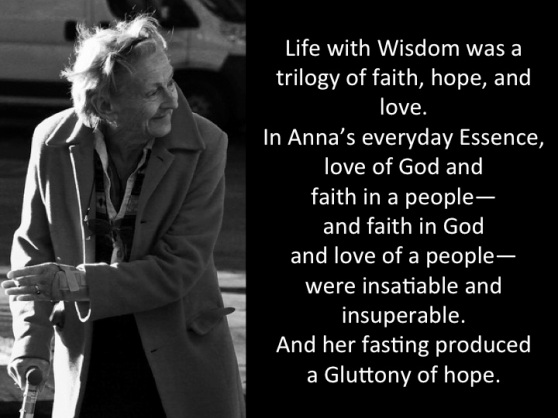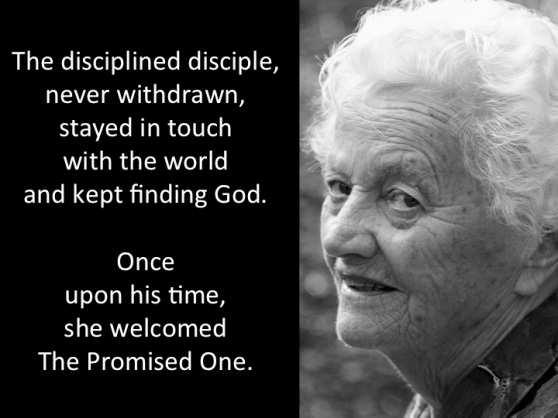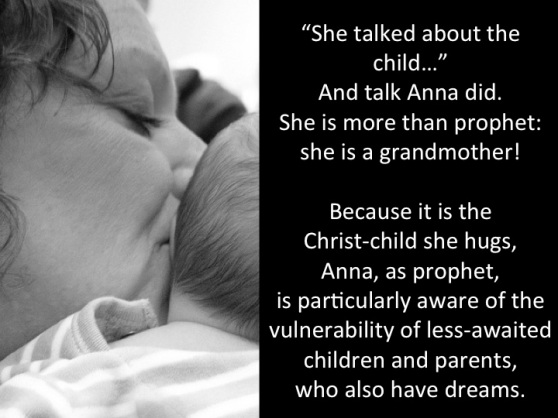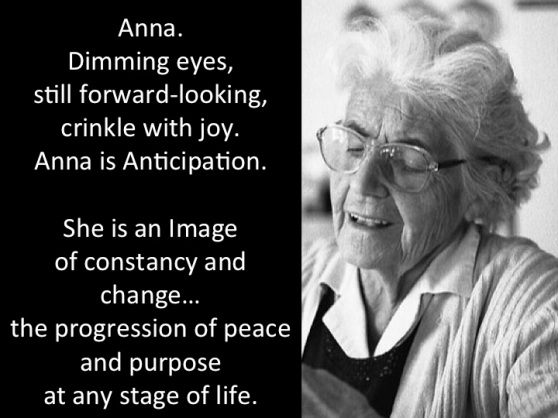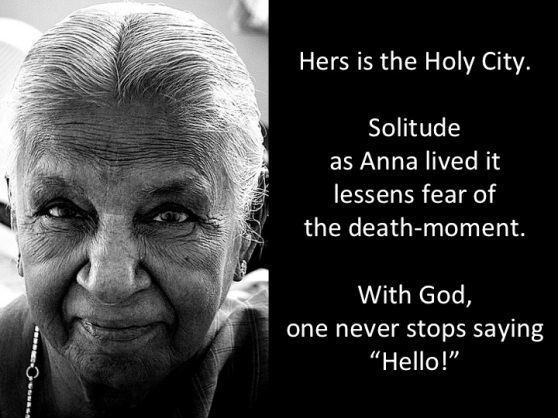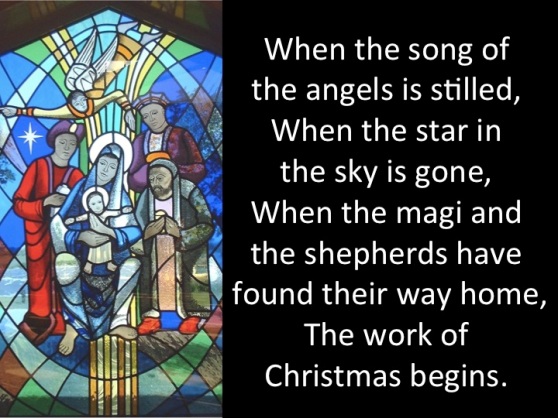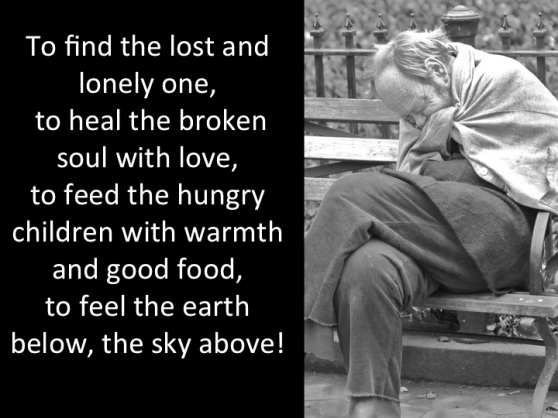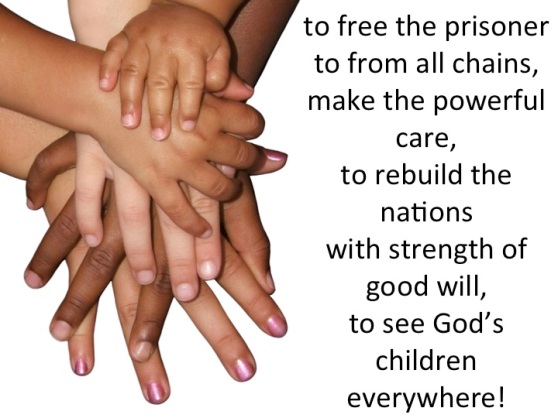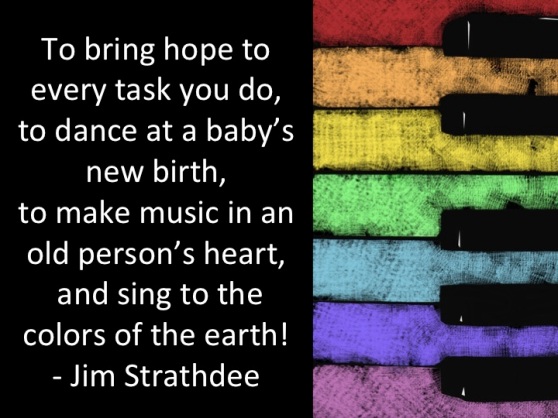“Arise, Shine!”
Isaiah 60:1-6, Matthew 2:1-12, and Luke 2:22-24, 36-38
January 6, 2012
First Presbyterian Church of Jesup
After the reading of scripture, five women read “Anna,” by Mary Lou Sleevi from “Sisters and Prophets,” accompanied by the following slides
“Arise, Shine!”
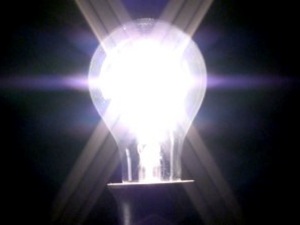 Epiphany! Have you ever heard someone say, “I have had an epiphany!”? In our culture the word “epiphany” has become synonymous with “brilliant idea” or “life changing thought.” The word may give us visions of someone with a light bulb floating above their head. It’s an unexpected sort of occurrence: a lighting flash, a stumbling upon. Epiphanies enter our lives before we even know we needed them, but once they occur, are not soon forgotten.
Epiphany! Have you ever heard someone say, “I have had an epiphany!”? In our culture the word “epiphany” has become synonymous with “brilliant idea” or “life changing thought.” The word may give us visions of someone with a light bulb floating above their head. It’s an unexpected sort of occurrence: a lighting flash, a stumbling upon. Epiphanies enter our lives before we even know we needed them, but once they occur, are not soon forgotten.
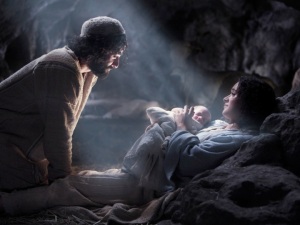 In the church calendar and in Biblical Greek, this word takes on a different depth. In the Greek: ἐπιφάνεια (epiphaneia) means “manifestation,” or “striking appearance.” The root of the word is close the word for “shine upon” or “to give light.” On the liturgical calendar, today is this day of Epiphany, this celebration of the manifestation of God through Jesus Christ. The celebration of when God became incarnate; when God took on human form and walked around.
In the church calendar and in Biblical Greek, this word takes on a different depth. In the Greek: ἐπιφάνεια (epiphaneia) means “manifestation,” or “striking appearance.” The root of the word is close the word for “shine upon” or “to give light.” On the liturgical calendar, today is this day of Epiphany, this celebration of the manifestation of God through Jesus Christ. The celebration of when God became incarnate; when God took on human form and walked around.
 This sort of epiphany is not just a light bulb above someone’s head, but a sunrise that lights a whole horizon in never ending day.
This sort of epiphany is not just a light bulb above someone’s head, but a sunrise that lights a whole horizon in never ending day.
As John 1: 4 describes Jesus’ incarnation: “What has come into being in him was life, and the life was the light of all people.”
It seems strange that Christ’s birth date and manifestation date are separate occurrences. Didn’t we already celebrate Christmas?
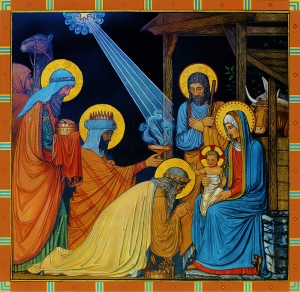 But those two dates are different for a reason: the Epiphany is the commemoration of when Christ was visited by the Magi or the three wise men. This particular visit changes the meaning of Christ’s birth. As Christian tradition goes, up until that point, only fellow Jews had commemorated Jesus’s birth. Jesus was still contained within his own cultural context. But the visit of the magi changes things. This was the first time he was visited by Gentiles. This was the first step towards Christ’s bringing about of a Kingdom that would unite all people to God, both Jews and Gentiles.
But those two dates are different for a reason: the Epiphany is the commemoration of when Christ was visited by the Magi or the three wise men. This particular visit changes the meaning of Christ’s birth. As Christian tradition goes, up until that point, only fellow Jews had commemorated Jesus’s birth. Jesus was still contained within his own cultural context. But the visit of the magi changes things. This was the first time he was visited by Gentiles. This was the first step towards Christ’s bringing about of a Kingdom that would unite all people to God, both Jews and Gentiles.
This is an important lesson for our own lives: Christ is only truly manifest in this world when we introduce him to those outside these walls. Christmas is only realized, when we live our lives in response to it, far beyond its allotted time on the calendar.
Contemporary hymn writer, Jim Strathdee writes of the importance of the mission of manifestation in his “Christmas Poem”[1]:
 Whenever there’s a major life change in a family there’s an initial few weeks where people are lined up to hold the new baby, casseroles lining the refrigerator form an edible memorial to a life lost, and the mailbox is flooded with cards. But then time passes and the life change becomes a part of the regular rhythm of things, a new family dynamic is adopted, a new social calendar is established. Things return to normal.
Whenever there’s a major life change in a family there’s an initial few weeks where people are lined up to hold the new baby, casseroles lining the refrigerator form an edible memorial to a life lost, and the mailbox is flooded with cards. But then time passes and the life change becomes a part of the regular rhythm of things, a new family dynamic is adopted, a new social calendar is established. Things return to normal.
 It’s tempting to do the same after Christmas. We have celebrated the birth of this new baby, Jesus of Nazareth. We have sung the carols, read the scriptures, hung the greens, and lit all the candles on the Advent wreath. We’re now ready for the “long winter’s nap,” prescribed in “’Twas the Night Before Christmas.” Now we get on with the rest of our lives, right?
It’s tempting to do the same after Christmas. We have celebrated the birth of this new baby, Jesus of Nazareth. We have sung the carols, read the scriptures, hung the greens, and lit all the candles on the Advent wreath. We’re now ready for the “long winter’s nap,” prescribed in “’Twas the Night Before Christmas.” Now we get on with the rest of our lives, right?
In the wake of Epiphany, we are summoned into a new reality, beyond the pre-Christmas normal and into the post-Epiphany exceptional. This great happening is something to be shared.
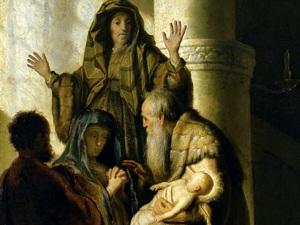 In our reading today we heard of the story of a woman who understood the significance of the incarnation. I love this telling of the story of Anna. Though scripture only gives us a couple of verses about this woman, this reading expands on the story and imagines all the hope and expectation that went into her Epiphany experience. She had waited at the temple for many, many years in the hope of Christ’s coming. Her eyes were opened to receiving Christ in their midst.
In our reading today we heard of the story of a woman who understood the significance of the incarnation. I love this telling of the story of Anna. Though scripture only gives us a couple of verses about this woman, this reading expands on the story and imagines all the hope and expectation that went into her Epiphany experience. She had waited at the temple for many, many years in the hope of Christ’s coming. Her eyes were opened to receiving Christ in their midst.
There is a beautiful story about Anna’s sort of waiting by minister Daniel Evans. He writes of performing the sacrament of baptism saying:
“Gently, as if passing treasured, fragile china dolls, they hand their babies to me there across the words that make the time. I splash the water and look down for recognition. I try to read those eyes to see if something’s there in innocence that none yet has taken note of, something special from that other side of being, birth; a message for us sinners gathered round a bowl of water and some ancient words. “I baptize . . .” I begin and think of Anna or old Simeon, lifting up a blushing Mary’s baby, all awash in wonder to be holding God in hand. The God who never tires of birthing love in this tired world came once, a child. I hold above the holy water these same new promises that same God makes to my world and wonder if God’s come again.”
Both Anna and Rev. Evans wait expectantly for God to come incarnate into this world. Waiting so that they may recognize and worship our Savior. Anna, is waiting for Jesus and Rev. Evans is waiting for Christ to come again. Wait a minute. Did you get that? Christ is coming again.
In the Gospel of Mark, Chapter 13, we meet Jesus in conversation with His disciples on the eve of his crucifixion. Right before breaking bread and sharing the cup, as we will do later in this service, He speaks of when He will come again. Mark 13:32-37 says:
“About that day or hour no one knows, neither the angels in heaven, nor the Son, but only the Father. Beware, keep alert; for you do not know when the time will come. It is like a man going on a journey, when he leaves home and puts his servants in charge, each with his work, and commands the doorkeeper to be on the watch. Therefore, keep awake—for you do not know when the master of the house will come, in the evening, or at midnight, or at cockcrow, or at dawn, or else he may find you asleep when he comes suddenly. And what I say to you I say to all: Keep awake.”
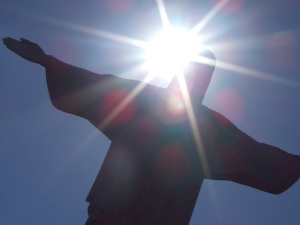 This echoes the prophet Isaiah’s call. Once we witness the light of Christ, once we have risen and are shining Christ’s light into the world, we must continue to stay awake in anticipation of Christ coming again. Which that leads to a more important question: Do you really believe that Christ is coming again? Have you ever looked at a newborn baby and thought: could it be? Or have the best parts of our Christian story already played out? The script has been written, the play is done, and now we can just celebrate the birth of a child and the redemption by our savior. Right?
This echoes the prophet Isaiah’s call. Once we witness the light of Christ, once we have risen and are shining Christ’s light into the world, we must continue to stay awake in anticipation of Christ coming again. Which that leads to a more important question: Do you really believe that Christ is coming again? Have you ever looked at a newborn baby and thought: could it be? Or have the best parts of our Christian story already played out? The script has been written, the play is done, and now we can just celebrate the birth of a child and the redemption by our savior. Right?
I know that this is a struggle for me. Like the religious scholar’s of Jesus’ time, I know what is the right answer. I know with every academic fiber of my brain that when someone asks me the line in the Apostle’s creed that follows “He ascended into heaven, and is seated at the right hand of the Father.” I know that the answer is: “He will come again to judge the living and the dead.” I know that, but is that something I eagerly anticipate? Or is it something I just think might happen someday, but doesn’t really have much to do with me. If I’m honest with myself I’ve done a lot more to prepare to celebrate Christ’s birthday that happened 2000 years ago, than I’ve done anything at all to prepare for Christ coming again. “Keep Awake,” the Gospel of Mark tells us. “Keep awake.” Christ’s coming again is not the sort of event in which we must go to sleep in order to receive presents under our tree. Rather, we are to stay alert with eyes open to meet our Savior. As Disciples of Christ Jesus, we are those very servants charged to take care of this world until Christ comes again, and then we will be judged for what has been done and not done.
John’s Revelation previews what we can expect from the return of Christ:
“Then I saw a new heaven and a new earth; for the first heaven and the first earth had passed away, and the sea was no more. And I saw the holy city, the new Jerusalem, coming down out of heaven from God, prepared as a bride adorned for her husband. And I heard a loud voice from the throne saying, “See, the home of God is among mortals. He will dwell with them as their God; they will be his peoples, and God himself will be with them; he will wipe every tear from their eyes. Death will be no more; mourning and crying and pain will be no more, for the first things have passed away.” And the one who was seated on the throne said, “See, I am making all things new.”
 This hopeful account of Christ’s coming again urges us to choose Christ as our Lord and Savior. The good news is this, by accepting Jesus as Christ, His death covers our sins as well.
This hopeful account of Christ’s coming again urges us to choose Christ as our Lord and Savior. The good news is this, by accepting Jesus as Christ, His death covers our sins as well.
And what of Christmas? Today’s Epiphany reminds us that while Christ has already come into this world to save us from our sins, Christ will come again to judge the world. This is our yearly reminder to “rise, shine,” “keep awake.” We don’t know what God has chosen as the next “fullness of time,” by which Christ will come again. But this yearly, heavenly birthday celebration serves as a bit of a wake up call, part of a larger advent. This Epiphany day may we arise with the joy that Christ has come into this world and shine with the hope that Christ will come again and make all things new. Amen.
